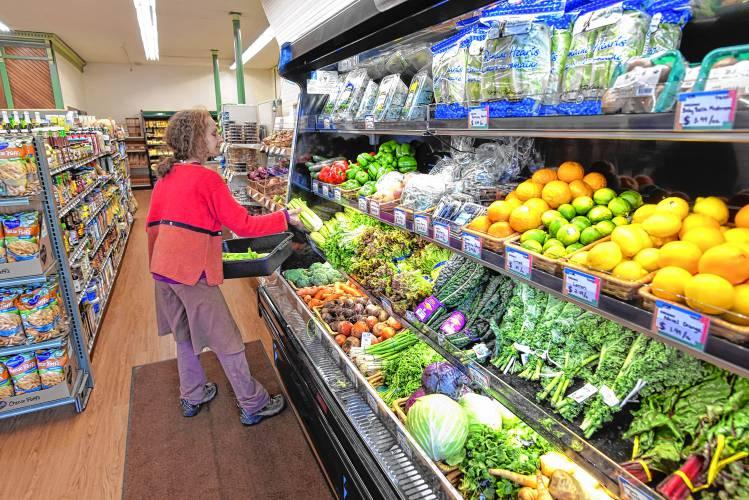Greenfield’s Food Co-op:

Eight years ago, First Lady Michelle Obama told the nation: “Our goal is ambitious. It’s to eliminate food deserts in America completely in seven years.”
An estimated 40 million Americans live in ‘food deserts,’ a term defined by the U.S. Department of Agriculture as an area where residents live more than one mile from a supermarket in urban/suburban areas, or more than 10 miles from a supermarket in rural areas. The theory is that because these communities lack access to healthy food that is affordable, they have worse outcomes by diabetes and obesity measures.
Half a century ago, Greenfield had three grocery stores in, or near, the downtown: Foster’s on Conway Street, an A&P on Main Street and a Grand Union on Federal Street. The latter two chain stores closed decades ago due largely to the market shift to larger grocery outlets and the construction of interstate 91. In many downtown “food deserts,” local food co-ops, like the Franklin Community Co-op’s Green Fields Market on Main Street, have become an oasis for healthy, affordable food. Since 1977, the Franklin Community Co-op has been offering healthy food, while addressing the issue of affordability.
Under the “Food for All” program, anyone on SNAP (food stamps), WIC (Women, Infants and Children) or SSI (Supplemental Security Income) can get a 10 percent discount on Co-op groceries. “You don’t have to be working members to get this discount,” explains Sarah Kanabay, co-op outreach and communications manager. “We’ve done a lot of outreach to grow this membership. SNAP is now 3 percent of sales, and the total number of Food For All members nearly doubled this past year to 215 people.”
Another initiative, the “Co-op Basics” program, provides essential items at reduced prices by making deals with suppliers, and lowering the co-op’s standard margins. Co-op Basics was started by the National Co-op Grocers, a co-op of co-ops, which enables local co-ops to offer their own in-store brand, called Field Day Organics, for products like cheese, pasta, juice, cereal, beans and bananas. “We purchase these products as group of food coops from suppliers like United Natural Foods Inc.,” Kanabay notes. “Our produce now is almost all organic and all local in season.”
Franklin Community Co-op also presents “Local Food Clinics,” a monthly educational event sponsored with its partners Just Roots, and the Western Mass Food Bank. The clinics educate shoppers about ways to integrate healthier, affordable foods, like Community Farm Shares, into their diet.
“We created a Healthy Food Access committee to foster programs like Food For All, Local Food Clinics, and Co-Op Basics to expand our offerings of items at a lower, more competitive price,” Kanabay explains. “It’s important that we serve all of our community, and that our prices are reflective of that goal. We have long-standing relationships with all our farmers. We’re deeply involved in our businesses and products. Affordable food is part of the local health of our economy. ‘Care for the community’ and ‘Health of our community’ are at the heart of what we do as a co-operative.”
Food access, and better eating habits, are part of the food co-op mission. Healthy food coupled with financial incentives to buy them, plus educational outreach, are the best resources to keep area residents healthy. There is an oasis in the ‘food desert’ in the Greenfield and Shelburne Falls market areas – in large measure due to the “economic justice” vision of the Franklin Community Co-op.
October is National Food Co-op Month. On Saturday, Oct. 20, at 7 p.m. at Leverett Crafts & Arts, and Wednesday, Oct. 24 at 6:30 p.m. at Temple Israel in Greenfield, the Leverett Co-op and the Franklin Community Co-op will be one of more than 50 locations around the nation cosponsoring a free screening of the documentary film “Food For Change,” directed by Franklin County filmmaker Steve Alves. The film focuses on food co-ops as a force for social and economic change in American culture. It is the first film to examine the important historical role played by food co-ops, and their pioneering efforts to create regional food systems. For more background go to: http://foodforchange.coop/.
Al Norman is a Greenfield resident known for his advocacy for the elderly and locally owned retailers and as a national consultant for those who oppose big box development.
Food access may not be the real problem. Eating habits are the target, and food co-ops that offer healthy food coupled with financial incentives to buy them, plus educational outreach, are a better resource to keep people healthy than any chain store.
By Al Norman, Wednesday, October 17, 2018







